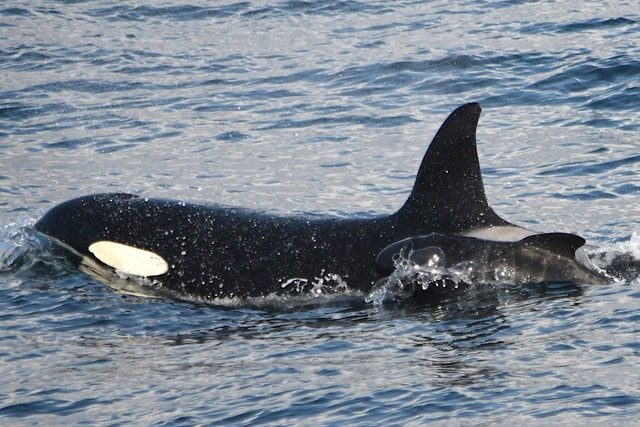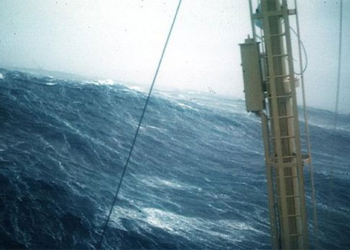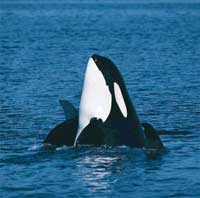In a recent study published in the Canadian Journal of Zoology, scientists reported unusual behavior observed in a female orca they have been tracking for several years.
This orca is named “Sædís,” part of a pod of orcas living in the waters off the west coast of Iceland. It appears to be infertile, or for some reason, the researchers indicated that it had never given birth.
However, suddenly, in August 2021, they spotted Sædís swimming alongside a small whale. The researchers were almost delighted for it until they realized: the small creature was not an orca but a young pilot whale.
“It is possible that [Sædís] abducted this young pilot whale from a group of pilot whales,” said Elizabeth Zwamborn, a whale researcher at Dalhousie University in Canada.

The female orca Sædís is leading a young pilot whale – Photo: Newsweek.
Observations recorded throughout the fall of 2021 showed that the young pilot whale consistently swam alongside Sædís and two other orcas. During this time, there was no pod of pilot whales around them. This was clearly unusual, as both orcas and pilot whales are social creatures that typically travel in groups.
There is a possibility that the pilot whale had lost its mother and Sædís took it in. However, looking back at the history of the orca pod off the coast of Iceland, Zwamborn leans towards the scenario that the young whale was abducted.
“Mother Mine” at Sea
From 2015 to 2021, researchers observed orcas being chased by pilot whales in this area. No reasonable explanation was provided, as orcas are clearly apex predators, hunting both great white sharks and other whale species.
Typically, pilot whales should fear orcas, who would be the ones hunting them. There has been evidence found in the stomachs of orcas showing that they do eat pilot whales.
However, in the waters off Iceland, scientists indicate that this has never occurred. The orca pod here has plenty of herring to eat, while pilot whales primarily consume squid. The two species fundamentally have no reason to compete for food, fight, or be aggressive towards each other.
“We do not know the reason for this, but if a female orca is here trying to capture a young one from a pod of pilot whales, that would definitely give them a reason to chase her away,” Zwamborn stated.
It is unclear when the orca named Sædís “abducted” the young pilot whale. However, scientists observed that since the young whale was by her side, Sædís consistently showed care towards it.
“The orca always swims next to the young pilot whale, placing it in a position under her pectoral fin. This means the calf is swimming right behind the orca’s pectoral fin,” said Marie Mrusczok, an orca researcher from the West Iceland Nature Center.
“This position allows a young whale to exert less tail movement compared to swimming alone and overcomes physical limitations when moving at high speeds—in other words, the calf is being ‘carried’ by the pressure waves created by the larger adult’s body.“
The Tragic Fate of the Young Pilot Whale—Sædís Attempts to Abduct Another Whale
Despite the nurturing behavior, Sædís had no milk to provide for her “child.” This stems from her never having been a mother before. Consequently, the young pilot whale was very emaciated, Zwamborn reported.
After some time, researchers no longer saw the young whale with Sædís. It may have died from starvation.

Orcas typically keep their calves in a position under their fins, as a form of “carrying” – (Photo: Nytimes).
Fast forward to 2022, scientists encountered the female orca Sædís clashing with a pod of pilot whales. It is possible that this orca was trying to abduct another young pilot whale from the pod, according to the research.
However, this time, Sædís was unsuccessful. The pod of pilot whales managed to chase her away, and scientists did not observe Sædís adopting any more calves.
While cross-species nurturing behavior has been documented in some marine animals in the past—such as in 2019 when researchers observed a bottlenose dolphin caring for a melon-headed whale—this is the first recorded instance of an orca nurturing a pilot whale.
Orcas have also never raised any calves from other species. They only nurture and care for their own offspring. Thus, this is likely a rare event stemming from the maternal instinct of an infertile female orca.
This further demonstrates that orcas are a species with a complex social life. They possess thoughts and behaviors driven by emotions similar to humans. Previously, there has also been evidence showing that orcas care for each other and mourn the deaths of their kin.




















































